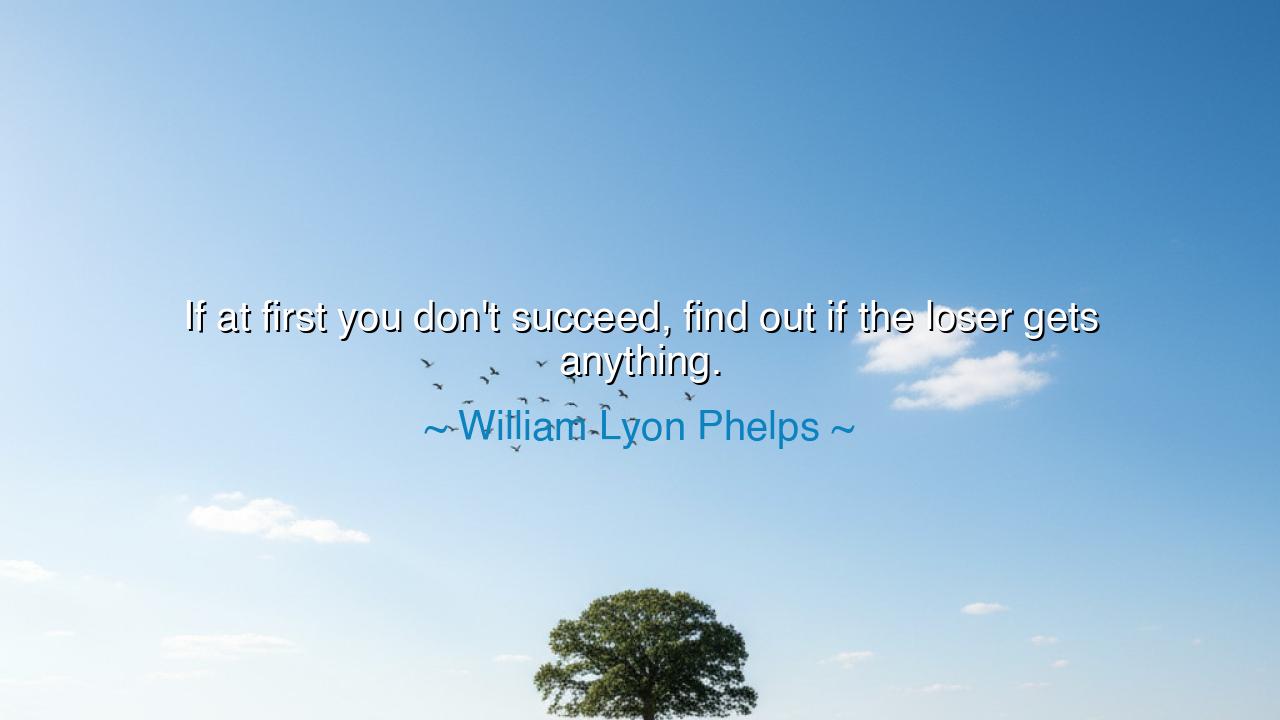
If at first you don't succeed, find out if the loser gets






When William Lyon Phelps wittily declared, “If at first you don’t succeed, find out if the loser gets anything,” he was not simply crafting a humorous observation about failure, but offering an insight into the human condition and the nature of success. Phelps, a scholar and critic, used his sharp wit to expose a truth we often overlook: success is not always defined by victory, and failure does not always mean a loss. The pursuit of goals, while noble, can often be as much about learning and finding value in the journey as it is about achieving the prize. In this subtle, yet profound statement, Phelps challenges us to question the rigid definitions of success and failure and to find meaning even in what others deem to be defeat.
In ancient times, the philosophers of Greece taught that wisdom comes not just from triumph, but from learning through loss. Socrates, that great seeker of truth, would often say that failure was an integral part of the pursuit of wisdom. He would enter dialogues knowing that he did not have all the answers, but through failure — through discovering what he did not know — he grew closer to understanding. In a similar vein, Phelps’s quote invites us to redefine failure, to see it not as a dead end but as a point on the path to greater insight. The one who fails has not necessarily lost; they may have gained a valuable lesson, one that could lead them to future success.
The idea that failure contains value was reflected in the life of Thomas Edison, one of history's greatest inventors. Edison famously failed thousands of times before he perfected the light bulb. Yet, he did not see his failures as losses. In fact, he said, “I have not failed. I've just found 10,000 ways that won't work.” Edison understood that failure was part of the process, that each setback offered him a new piece of the puzzle. Just as Phelps humorously suggests, Edison was more interested in the rewards of failure than the rewards of success, knowing that each “loss” was a step closer to the grand prize. In the end, his failure was not a mark of defeat but a badge of his relentless pursuit of discovery.
Phelps’s observation also touches on a deeper human truth: the desire for recognition and reward is not just tied to success, but to the efforts we make, the struggles we face, and the resilience we show in adversity. The "loser" in any contest or competition is not always left empty-handed. Many times, effort is rewarded even if the desired outcome is not achieved. Take, for instance, the Olympic Games, where countless athletes train for years, not necessarily with the expectation of winning gold, but for the honor of competing, for the personal growth, and for the opportunity to be recognized for their perseverance. In many ways, the losers of the Games often receive as much recognition as the victors, for their courage, their spirit, and their commitment to excellence.
The meaning of Phelps’s words is thus twofold. On the one hand, they offer us a reminder that success is not always the most important thing in life. It is the journey, the process of striving, learning, and growing that gives meaning to our efforts. On the other hand, Phelps urges us to value all experiences — both win and loss — for there are often hidden rewards in the lessons learned from our failures. The ancient stoics believed that true strength lies in accepting both fortune and misfortune with grace, understanding that neither defines our worth. Similarly, Phelps encourages us to seek out the rewards in every experience, even those that appear to be failures.
The lesson, then, is one of perspective. In every endeavor, there are lessons to be learned, growth to be achieved, and rewards to be found. We must not measure success only by the visible prize, but by the wisdom and growth that each step along the journey provides. Failure, when seen through this lens, becomes an essential part of the process — one that helps refine our character, sharpen our focus, and ultimately lead us to greater success. Just as Edison found countless ways that did not work, we too must see failure not as an end, but as a valuable part of the path to greatness.
Practical actions for embracing failure and finding reward:
-
Reframe failure: When you fail, instead of focusing on what was lost, ask yourself what lessons you can take from the experience.
-
Value the journey: Recognize that growth is the ultimate reward, not just the prize at the end.
-
Celebrate perseverance: Understand that the effort itself is worthy of recognition, regardless of the outcome.
-
Keep going: When faced with setbacks, embrace them as opportunities for growth and self-discovery, rather than as dead ends.
For, as William Lyon Phelps wisely observed, it is not always about winning. The real reward often lies in the pursuit itself — in the effort, the resilience, and the wisdom gained along the way. Each experience, whether it appears to be a success or failure, carries within it a lesson that can help shape the future. Never underestimate the value of trying, for the true measure of success is found not just in the destination, but in the wisdom gained from the journey.






AAdministratorAdministrator
Welcome, honored guests. Please leave a comment, we will respond soon